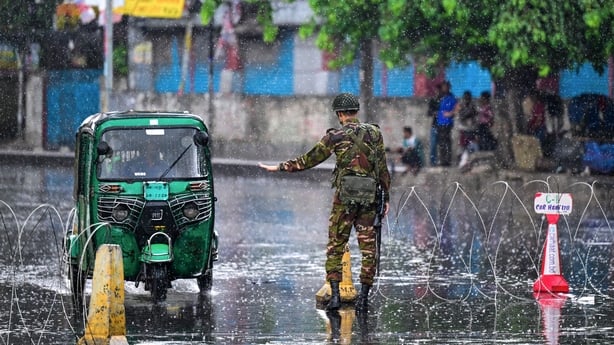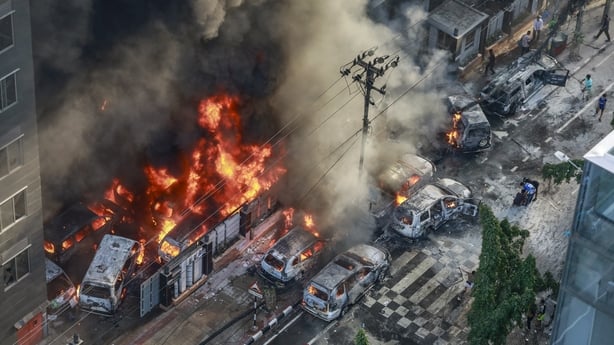The number of arrests in days of violence in Bangladesh has passed the 2,500 mark, according to an AFP tally, after protests over employment quotas sparked widespread unrest.
Police officials in Dhaka, Chittagong and other locations gave further details of detentions that brought the total held to 2,580.
At least 174 people have died, including several police officers, according to a separate AFP count of victims reported by police and hospitals.
What began as demonstrations against politicised admission quotas for sought-after government jobs snowballed last week into some of the worst unrest of Prime Minister Sheikh Hasina's tenure.
A curfew was imposed and soldiers deployed across the South Asian country, and a nationwide internet blackout drastically restricted the flow of information, upending daily life for many.
On Sunday, the Supreme Court pared back the number of reserved jobs for specific groups, including the descendants of "freedom fighters" from Bangladesh's 1971 liberation war against Pakistan.

The student group leading the demonstrations suspended its protests yesterday for 48 hours, with its leader saying they had not wanted reform "at the expense of so much blood".
Student leader Nahid Islam, who said he fears for his life, extended the halt by another 48 hours.
Mr Nahid, head of Students Against Discrimination, the main group organising the protests, said there would be no protests during the 48-hour extension.
"Our demand is the government restore the internet, withdraw the curfew, reopen campuses and protect the students protesters", he said, including "returning" four missing co-ordinators from his organisation.
Restrictions remained in place after the army chief said the situation had been brought "under control".
The telecommunications minister said broadband internet would be restored on Tuesday evening, although he made no mention of mobile internet -- a key communication method for protest organisers.
And officials said an afternoon break in the curfew would be extended to five hours on Wednesday to help citizens obtain daily necessities, with banks re-opening for the first time.
There was a heavy military presence in Dhaka, with bunkers set up at some intersections and key roads blocked with barbed wire.
But more people were on the streets, as were hundreds of rickshaws.
"I did not drive rickshaws the first few days of curfew, But today I didn't have any choice," rickshaw driver Hanif said.
"If I don't do it, my family will go hungry."
The response to the protests by authorities has been widely criticised, with Bangladeshi Nobel Peace Prize laureate Muhammad Yunus urging "world leaders and the United Nations to do everything within their powers to end the violence" in a statement.
The 83-year-old economist is credited with lifting millions out of poverty with his pioneering microfinance bank but earned the enmity of Ms Hasina, who has accused him of "sucking blood" from the poor.
"Young people are being killed at random every day," Mr Yunus said. "Hospitals do not reveal the number of wounded and dead."

Diplomats in Dhaka also questioned the government's actions, with US Ambassador Peter Haas telling the foreign minister he had shown a one-sided video at a briefing to diplomats.
Government officials have repeatedly blamed the protesters and opposition for the unrest.
Over the course of the violence, at least 200 people had been arrested in the central districts of Narayanganj and Narsingdi, their police chiefs said, while at least 80 had been held in Bogra.
At least 168 people had been arrested in the industrial city of Gazipur, 75 in the northern city of Rangpur, and 60 in Barisal in the south, senior police officials said.
In the rural and industrial part of Dhaka, 80 people were arrested, on top of an earlier figure of at least 532 for the capital, bringing the overall total to 1,195.
With around 18 million young people in Bangladesh out of work, according to government figures, the June reintroduction of the quota scheme, halted since 2018, deeply upset graduates facing an acute jobs crisis.
With protests mounting, the Supreme Court curtailed the number of reserved jobs from 56% of all positions to 7%, mostly for the children and grandchildren of "freedom fighters" from the 1971 war.
The decision fell short of protesters' demands to scrap the "freedom fighter" category altogether.
Ms Hasina's spokesman told AFP she had approved a government order putting the Supreme Court's judgement into effect.
Critics say the quota is used to stack public jobs with loyalists to Hasina's Awami League.
Ms Hasina, 76, has ruled the country since 2009 and won her fourth consecutive election in January after a vote without genuine opposition.
Her government is also accused by rights groups of misusing state institutions to entrench its hold on power and stamp out dissent, including by the extrajudicial killing of opposition activists.

